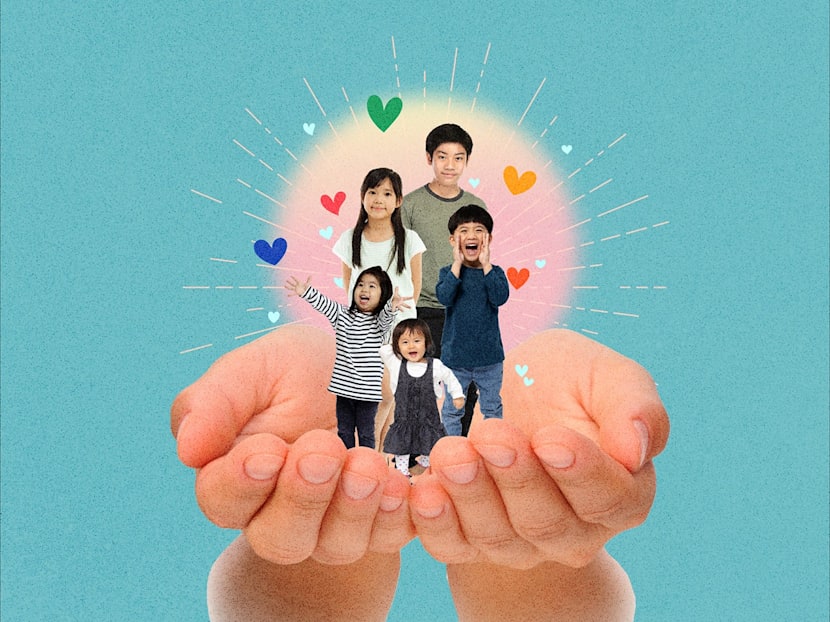Why loving my five kids equally looks different for each of them
Equal love isn't about treating every child the same, says mum-of-five Kelly Ang. Instead, it's about making each one feel fully seen and valued.

For parents with a sizeable number of kids, it can be hard to ensure each child is being given equal amounts of attention and love. (Illustration: CNA/Samuel Woo, iStock)

This audio is generated by an AI tool.
I've heard the argument for having just one or two children countless times. It goes like this: "I want to be able to love my children equally, and having more children would make that really difficult."
Point taken, but as a mum of five kids aged two to 12 years, I'm here to argue and stand by my reality: I love each of my five kids equally, and I'm willing to die on this hill.
Naysayers might point out: "But you only have a pair of hands and 24 hours a day. You're outnumbered all the time. How could you possibly give each of your children the individualised attention and love they need?"
My trick isn't in having more hands – although I wish I did.
In fact, my "trick" isn't a trick at all. All I do is make every effort to know each of my children inside and out, and spend quality time with them.
There's simply no shortcut or replacement for truly knowing who my kids are and respecting them as individuals. For me, this is the key to loving each of them equally, in exactly the way they need.
It's also about not favouring one over the other in any way, and making sure I apologise if I've ever made them feel less than their sibling, because comparison truly robs you of joy.
EQUAL LOVE DOESN'T MEAN EQUAL TREATMENT
I love my children equally, but I love them in different ways. Some might disagree, but it is precisely because I love them equally that I treat them differently in the first place.
Take school work, for example.
These days, I spend extra time with my younger daughter on her writing, spelling and reading, as well as coaching my eldest son, who is currently taking his PSLE.
That doesn't mean I love them more than the others – it just means these are the seasons when they need more from me.
When the older ones were younger, I gave them the same focused attention.
And after next week, my PSLE child will no longer need this level of support anymore.
And it's not just academics. The way my children show and receive love is also different.
One loves receiving and giving hugs and kisses, while another loves it when I pack his favourite food for lunch. A third always asks us to play board games with him, while another delights in made-up stories on morning car rides to school.
If I insisted on treating them all "the same", like playing board games with every child, for instance, it wouldn’t land in the same way.
Instead, I try to learn what fills each child’s "love tank", and give them that. To me, that's how they know they’re equally cherished – not by receiving identical treatment, but by being loved in the way that makes sense to them.
DIFFERENT KIDS, SAME VALUES
While I celebrate my children's differences, I also emphasise what binds us together.
Our home is built on shared rituals, mutual respect, and plenty of love – and everyone, from the grandparents to my youngest who recently turned two, plays a part in creating it.
We hold to the same values of honesty, integrity, perseverance and kindness. The children know that these standards apply equally to all, and in that fairness, they feel equally loved.
This shows up in small daily moments. When they come home after school, everyone takes turns sharing their stories so each voice is heard.
When it comes to rules, such as eating sweets only on weekends, there are no exceptions – even for my two-year-old, who doesn't understand and always asks for treats on weekdays.
The older siblings would try to plead on her behalf, but I reminded them that consistency matters. So instead, we comfort her with cuddles and fruit.
INTENTIONALITY IS KEY
People often ask how it's possible to love all your children equally when time, energy and resources are so limited.
They're not wrong, but what I've learnt is that love doesn't always have to be measured in equal hours or equal effort.
The key thing for us is really about being intentional.
Sometimes, that means carving out time for one-on-one dates with our kids.
But more often, it's about the little things, such as promising to laminate your child's drawing, packing a lunch with their favourite foods, or remembering to bring their favourite water bottle in the morning.
These may sound like small gestures, but putting in the effort to remember the details and following up with genuine care means the world to them.
LOVE IN THE CHAOS
Of course, our household is not always calm and curated.
Our post-dinner scene is usually lively with noise, mess and movement – our toddler wailing because she's tired, wet-haired girls waiting for the blowdryer, and boys waiting for a chat while winding down for bedtime.
Times like these make me feel like I don't have enough time and attention to give to each of them. But somehow, my husband and I make it work every night by tag-teaming.
I dry the boys' hair while their dad brushes the girls' teeth. Then he takes over hair-drying for the girls while I go to the boys' room to chat about their game strategies, school and funny trivia.
I apply eczema cream to my son as we talk, with my two-year-old looking at a book.
Afterwards, I tuck them in, and their dad keeps chatting with them after lights out, while I go to my room with the toddler and girls to chat before bed. The girls may ask for a story or shadow play, and I try to oblige if it's not too late.
If this sounds chaotic, it absolutely is.
But it's also a rhythm that we've grown accustomed to and look forward to every night, because every child goes to bed with their needs fully met, feeling loved and secure – their nightly gurgling laughter, raucous chatter and warm hugs tell me so.
There are nights when I slip up or lose my temper. But do they know that I love them all equally, fiercely and unconditionally?
Without a doubt. I tell them, I show them, and I try my best to do better by them every day.
Kelly Ang is a mother of five and a freelance writer.












